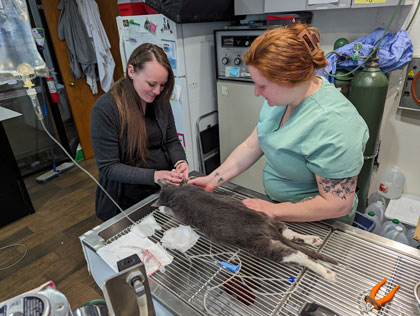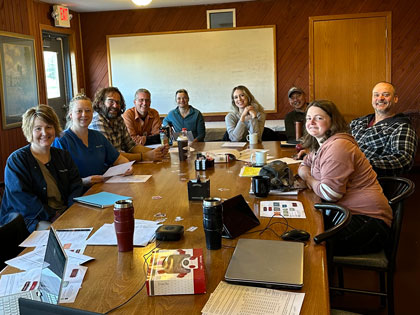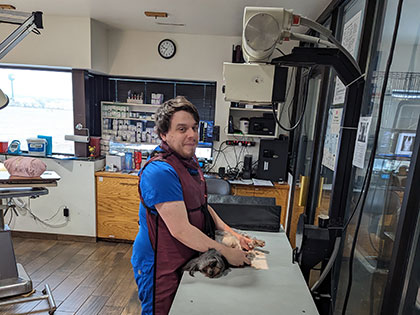success story
Spring Green, Mazomanie vet clinics switch to cooperative ownership
Spring Green, Mazomanie vet clinics switch to cooperative ownership
Veterinarians say co-op structure will keep their clinics open for the long term
 In spring 2022, veterinarians Mark Baenen and John Dally had been caring for the pets of local residents for about 20 years, and they began to contemplate the future.
In spring 2022, veterinarians Mark Baenen and John Dally had been caring for the pets of local residents for about 20 years, and they began to contemplate the future.
Graduates of the University of Wisconsin School of Veterinary Medicine in Madison, Baenen and Dally owned two local clinics: Spring Green Animal Hospital, which they opened in 2003, and Mazomanie Animal Hospital, about 15 miles east, which they’d purchased in 2020 when its owner had struggled to find a buyer. What would happen to the clinics if either Baenen or Dally got sick, died, or wanted to retire? How could they make sure local residents would have a veterinarian nearby to care for their dogs and their cats, their rabbits and their chinchillas?
Bucking the buyout trend
Running a small business in any rural area can be a challenge; so can attempts to sell the business. Corporations have been buying up vet clinics in larger cities, including one in Dodgeville. “Our industry is in a phase of consolidation and corporatization,” says Baenen. “That’s one of the only options you have right now. And it’s the exact opposite of what we wanted.”
 One alternative was to form a cooperative. “Wisconsin has a great history of cooperatives,” Baenen says. He and Dally sought help from the UW Center for Cooperatives and the Massachusetts-based ICA Group, which consults about worker cooperatives. They applied for a $21,300 grant from WEDC. “We knew it was going to take a fair amount of money to hire a lawyer, an accountant, and consultants. We wanted to do this the right way and serve as an example to others,” Baenen says.
One alternative was to form a cooperative. “Wisconsin has a great history of cooperatives,” Baenen says. He and Dally sought help from the UW Center for Cooperatives and the Massachusetts-based ICA Group, which consults about worker cooperatives. They applied for a $21,300 grant from WEDC. “We knew it was going to take a fair amount of money to hire a lawyer, an accountant, and consultants. We wanted to do this the right way and serve as an example to others,” Baenen says.
The key was to convince employees that establishing a cooperative was a good idea and that buying a membership would not be so expensive that they’d have to mortgage their homes to put up the cash.
On Jan. 1, 2023, the clinics converted to cooperative ownership, with 17 of the 25 employees—including seven full- or part-time veterinarians—as the owners, each with an equal share. The name of the new umbrella organization is Cooperative Veterinary Care.
The transition has gone “amazingly well,” Baenen says. “Before the switch, if you asked an employee to take on extra duties, they might say, ‘Sorry, I’m already too busy.’ Now that they are owners, if there’s additional work to do, they’ll say, ‘Yeah, I’ll do it.’ That has absolutely changed from a year ago. It’s more work but there are more benefits at the end of the year.”
He says the clinic’s clients have supported the switch. “We’ve had a really positive response,” Baenen says. “People say they’re glad we will have a vet clinic in this community for the next 100 years.”
A foundation for the future

Today, as a co-op, the Spring Green Animal Hospital and the Mazomanie Animal Hospital are caring for animals just as they did before, Baenen says. Other small-town vets have been in touch, asking for information about the switch.
“I always look at it as taking care of people. You get this job because you love animals. But you’re really helping people—and helping people take care of their animals. I call us an essential service for a small town,” Baenen says.
He is no longer worried about the clinics’ future. “What will happen if I die? Right now, they will be viable, no matter what happens,” he says.
“Our industry is in a phase of consolidation and corporatization … and it’s the exact opposite of what we wanted.”



